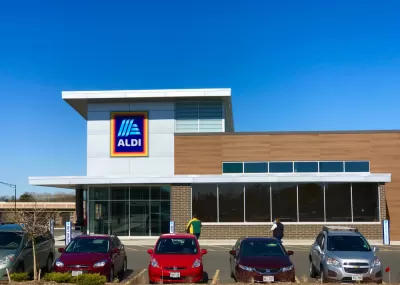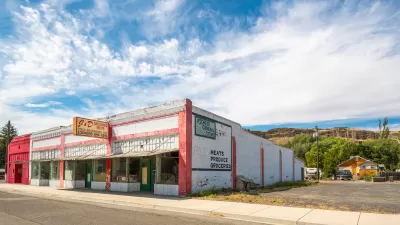If you haven't heard of Aldi yet, you probably will soon.

Nathaniel Meyersohn reports on Aldi, "the no-frills German discount grocery chain that’s growing aggressively in the United States and reshaping the industry along the way."
According to Meyersohn, the secret to Aldi's success is an extreme focus on efficiency. The effect is immediately noticeable.
New customers may be jolted at first by the experience of shopping at an Aldi, which expects its customers to endure a number of minor inconveniences not typical at other American grocery stores. Shoppers need a quarter to rent a shopping cart. Plastic and paper bags are available only for a fee. And at checkout, cashiers hurry shoppers away, expecting them to bag their own groceries in a separate location away from the cash register.
But Aldi has built a cult-like following. When it enters a new town, it’s not uncommon for hundreds of people to turn out for the grand opening. The allure is all in the rock-bottom prices, which are so cheap that Aldi often beats Walmart at its own low-price game.
The company already has 1,800 stores in 35 states and has plans for growth in the Midwest, the Mid-Atlantic, Florida, and California, explains Meyersohn. Growth is happening so quickly, Aldi will soon be the nation's third largest supermarket chain.
The article includes coverage of the tactics that help the company keep real estate costs down: "Size is one factor. A Walmart supercenter averages around 178,000 square feet. Costco warehouses average around 145,000 square feet. Aldi’s small box stores, however, take up just a fraction of that space, at 12,000 square feet on average."
FULL STORY: How a cheap, brutally efficient grocery chain is upending America's supermarkets

Planetizen Federal Action Tracker
A weekly monitor of how Trump’s orders and actions are impacting planners and planning in America.

San Francisco's School District Spent $105M To Build Affordable Housing for Teachers — And That's Just the Beginning
SFUSD joins a growing list of school districts using their land holdings to address housing affordability challenges faced by their own employees.

The Tiny, Adorable $7,000 Car Turning Japan Onto EVs
The single seat Mibot charges from a regular plug as quickly as an iPad, and is about half the price of an average EV.

Seattle's Plan for Adopting Driverless Cars
Equity, safety, accessibility and affordability are front of mind as the city prepares for robotaxis and other autonomous vehicles.

As Trump Phases Out FEMA, Is It Time to Flee the Floodplains?
With less federal funding available for disaster relief efforts, the need to relocate at-risk communities is more urgent than ever.

With Protected Lanes, 460% More People Commute by Bike
For those needing more ammo, more data proving what we already knew is here.
Urban Design for Planners 1: Software Tools
This six-course series explores essential urban design concepts using open source software and equips planners with the tools they need to participate fully in the urban design process.
Planning for Universal Design
Learn the tools for implementing Universal Design in planning regulations.
Smith Gee Studio
City of Charlotte
City of Camden Redevelopment Agency
City of Astoria
Transportation Research & Education Center (TREC) at Portland State University
US High Speed Rail Association
City of Camden Redevelopment Agency
Municipality of Princeton (NJ)





























